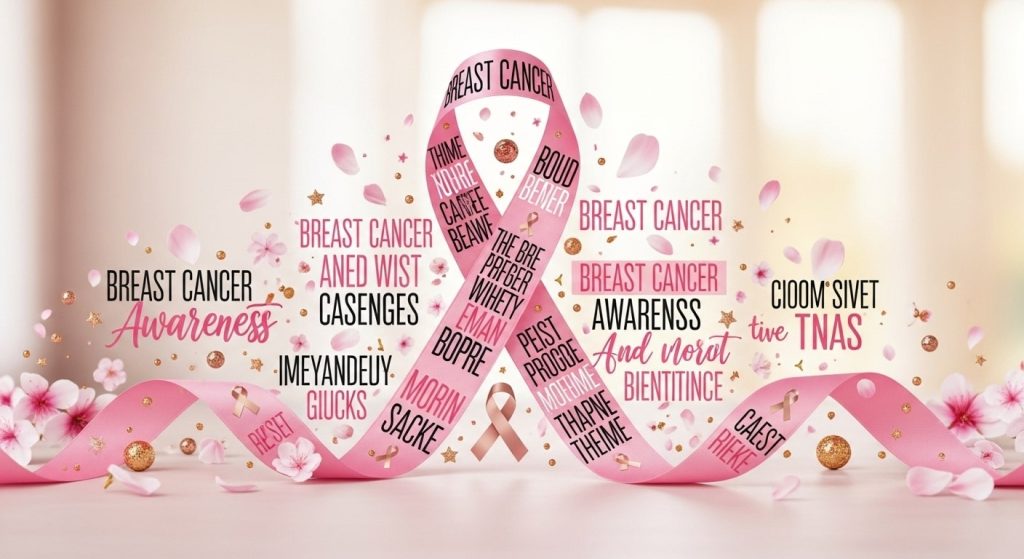
Breast cancer quotes
The fight against breast cancer is as much about emotional resilience as it is about medical treatment. Words have always had the ability to empower, uplift, and offer hope in times of great uncertainty, and when it comes to breast cancer, carefully chosen quotes can make an immense difference. These quotes not only inspire those currently undergoing treatment but also provide comfort for survivors and families who share in the struggle. The right message can be a companion through chemotherapy, radiation, surgery, or recovery, serving as a daily reminder that strength is always within reach. In today’s digital era, sharing these quotes has become easier than ever, whether through social media, support group discussions, or personal journals that capture the raw journey of survival.
Over the years, some of the most moving fight-for-breast-cancer quotes have come from survivors themselves, celebrities who have walked the same path, and advocates who dedicate their lives to raising awareness. These voices remind us that even in the darkest moments, there are reasons to keep pushing forward. Words like “You are stronger than you think” or “Hope is the heartbeat of the soul” may appear simple, yet they echo deeply in the hearts of those who need encouragement most. Unlike medical statistics, which often feel impersonal, quotes carry human warmth and the lived experiences of countless fighters. By weaving these words into daily life, one can cultivate resilience and courage, essential companions in the journey toward healing.
Many breast cancer organizations also curate collections of powerful quotes, using them as part of campaigns that spread awareness about early detection and survivorship. They become tools for both education and motivation, reaching audiences who may be hesitant to discuss the illness openly. For instance, when quotes are used in fundraising campaigns, they add a human element to the cause, ensuring people connect emotionally rather than simply seeing numbers or facts. This connection can translate into greater support for research, advocacy, and treatment development. Just as treatment requires consistency, the ongoing sharing of supportive messages ensures that hope is sustained throughout all phases of the cancer journey.
Why Quotes Matter in the Fight Against Breast Cancer
Quotes about fighting breast cancer work because they combine brevity with depth, capturing a universe of emotions in just a few words. Someone beginning chemotherapy may find strength in a line that highlights courage, while a survivor may resonate with a message about growth and transformation. This universality makes them powerful and versatile tools. Unlike lengthy essays or clinical information, a single quote can be remembered and repeated, becoming a personal mantra. Over time, these mantras create positive reinforcement that counters the fear and uncertainty of living with breast cancer.
Psychologists have often emphasized the role of affirmations and positive self-talk in healing and recovery. In the context of cancer, where stress and anxiety levels can be overwhelming, reading or repeating fight quotes provides a structured way to regain focus and control. Consider the difference between entering treatment with dread versus carrying in a phrase such as “I am more than my diagnosis.” The shift in perspective can improve not just mood but potentially influence treatment adherence. Survivors frequently mention that repeating empowering words allowed them to maintain a sense of normalcy in an otherwise turbulent chapter of life.
Quotes also transcend individual benefit and can be shared to inspire communities. A caregiver who reads a powerful quote may find renewed energy to support a loved one, while entire groups can rally around a message during awareness campaigns. When survivors gather for events, such as breast cancer walks, banners often display short but striking quotes. These words transform into collective rallying cries, fostering solidarity and reminding participants that no one walks this path alone. This communal aspect makes quotes far more than literary expressions—they become symbols of unity, remembrance, and defiance in the face of hardship.
Examples of Powerful Breast Cancer Quotes
One of the most commonly shared quotes is: “You never know how strong you are until being strong is your only choice.” This statement captures the essence of resilience during times when control seems lost. Another enduring message comes from Maya Angelou: “I can be changed by what happens to me, but I refuse to be reduced by it.” Such words resonate because they emphasize the capacity for inner growth, even when facing overwhelming challenges. Survivors often return to these quotes during recovery, reflecting on how their experiences reshaped them into stronger, more compassionate individuals.
Celebrities have also played a significant role in spreading hope through their words. For example, musician Sheryl Crow, a breast cancer survivor, once remarked that her journey taught her to slow down and appreciate the small moments in life. Statements like hers remind people that healing is not just about physical health but also about emotional rediscovery. Similarly, television host Robin Roberts shared that faith and positivity were crucial parts of her fight, showing how deeply personal beliefs can become anchors during treatment. These widely known personalities bring visibility to the fight, encouraging others to seek support and maintain faith in recovery.
Quotes from advocacy organizations are equally important. The National Breast Cancer Foundation, for instance, frequently uses messages that highlight community, stating, “Together, we are stronger.” This collective approach reminds readers that strength is magnified when shared. Many find comfort in such phrases, as they remove the sense of isolation that can accompany a diagnosis. The combination of personal and organizational voices ensures a wide variety of perspectives that meet people at different points in their journey. Each quote, whether born of pain, hope, or triumph, adds to the collective wisdom of the breast cancer community.
Practical Ways to Use Inspirational Quotes
Integrating breast cancer quotes into everyday life can be both therapeutic and motivating. Many survivors and patients create journals filled with their favorite lines, using them as daily affirmations to stay positive during treatment. This simple practice can offer a consistent reminder of hope, even on days when energy feels drained. Others choose to place quotes around their living space, on mirrors, refrigerator doors, or even phone screens. These constant visual reminders can transform the home environment into a sanctuary of positivity, encouraging resilience without requiring active effort each time.
Support groups often encourage members to share their most meaningful quotes during meetings. Doing so allows participants to learn from each other’s sources of strength, while also reinforcing a shared bond. The practice also extends to online spaces, where breast cancer forums and social media groups regularly post quotes that quickly spread across the community. This digital sharing amplifies the reach of hope, ensuring that encouragement travels across borders and time zones. It is not uncommon for someone battling cancer in one country to find inspiration from a quote posted thousands of miles away, proving the universality of words.
In addition, quotes can be used during fundraising events, awareness campaigns, and memorial services. They serve as conversation starters, encouraging donors and participants to connect emotionally with the cause. At times, they are also printed on merchandise such as T-shirts, mugs, or wristbands, ensuring that the message travels wherever the person goes. By using quotes creatively, communities not only raise awareness but also normalize conversations around breast cancer. This normalization is crucial because it reduces stigma and creates an environment where people feel supported rather than isolated.
Motivational Practices
- Daily Affirmations: Write down a powerful breast cancer quote each morning and read it aloud. This helps establish a mindset of strength before facing the day’s challenges.
- Visual Reminders: Place quotes on walls, mirrors, or digital screens. Surrounding yourself with positive words creates a subconscious reinforcement of hope and determination.
- Support Group Sharing: Introduce quotes during meetings. Hearing them from others validates shared experiences and creates stronger bonds between members.
- Event Integration: Use quotes on banners, T-shirts, or speeches during walks and fundraisers. These messages rally participants and amplify awareness campaigns.
- Journaling: Collect quotes in a dedicated notebook. Reflecting on them regularly fosters long-term resilience and provides emotional clarity.
- Gift Personalization: Share meaningful quotes on greeting cards or care packages for those undergoing treatment. Personal touches can significantly uplift spirits.
Comparative Data on Quote Impact
The following table compares different ways of using breast cancer quotes and explains their potential impact on emotional well-being:
| Method | Usage Example | Primary Benefit | Emotional Impact |
|---|---|---|---|
| Daily Affirmations | Reading a quote each morning aloud | Promotes positive self-talk | Builds confidence and resilience |
| Support Groups | Sharing quotes during weekly meetings | Fosters community support | Reduces feelings of isolation |
| Event Campaigns | Displaying quotes at charity walks | Raises awareness and unity | Encourages collective motivation |
| Digital Sharing | Posting quotes on social media | Broadens reach across networks | Spreads inspiration globally |
Modern Trends in Breast Cancer Messaging
Recent trends show that fight-for-breast-cancer quotes are becoming more personalized and visually appealing. Social media platforms are flooded with custom-designed graphics featuring survivor quotes or motivational lines paired with symbolic pink ribbons. This aesthetic approach makes them more shareable and engaging, particularly among younger audiences who might not respond to traditional awareness methods. By blending visual design with powerful words, organizations ensure their message captures attention in crowded digital spaces. The viral nature of these posts demonstrates the continued relevance of simple but inspiring words in advocacy and awareness.
Furthermore, technology has made it possible to integrate quotes into mobile health apps designed for patients and caregivers. Some apps provide daily notifications with uplifting words, encouraging users during treatment or recovery. This integration reflects how mental health support is being embedded into digital care systems. By offering quotes alongside symptom tracking and medical reminders, these platforms provide holistic support. This combination is particularly important as emotional strength often influences how patients approach their physical treatment, ensuring a balanced focus on body and mind.
Global movements such as Breast Cancer Awareness Month continue to leverage quotes in campaigns that highlight both survivorship and remembrance. During these campaigns, survivors often share personal mantras that kept them strong, giving the wider community authentic voices to rally around. By amplifying these voices, media ensures that breast cancer awareness extends beyond statistics and into the realm of empathy and lived experience.
The Future of Inspirational Messaging
As research advances and treatment outcomes improve, the role of inspirational messaging will likely evolve further. Future breast cancer quotes may not only focus on strength during illness but also celebrate thriving in survivorship. The language of hope may expand to include themes of innovation, scientific progress, and the victories achieved through global collaboration. Survivors will increasingly emphasize not just enduring cancer but living vibrantly afterward, reflecting a narrative shift toward empowerment. This change ensures that quotes remain relevant, offering encouragement that matches the modern understanding of cancer journeys.
At the same time, awareness campaigns may rely even more heavily on personalized storytelling, where quotes are drawn directly from real experiences. This authenticity helps counter misinformation while reinforcing the humanity behind the statistics. As people continue to seek connection online, personalized survivor quotes could become central to digital advocacy. They not only inspire but also educate, proving that lived experience is as valuable as clinical expertise in shaping perceptions and attitudes about breast cancer.
Ultimately, the enduring power of words will continue to shape how we view the fight against breast cancer. Whether written in journals, displayed at events, or shared across social media, quotes will remain a timeless method of reminding individuals that hope, courage, and love persist even in the face of immense adversity. They embody the spirit of resilience, transforming pain into strength and isolation into unity, ensuring that no one ever has to walk the journey alone.

